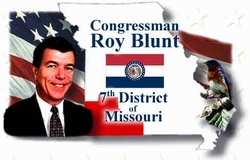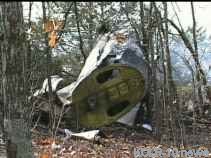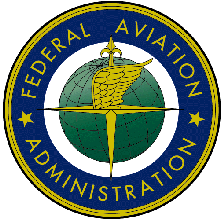FAA harassment Cited as Contributory to CFI's Fatal
Accident
 A report from the DoT's Inspector General, Kenneth
Mead, written at the behest of Congressman Roy Blunt (R-MO), is not
flattering to the FAA.
A report from the DoT's Inspector General, Kenneth
Mead, written at the behest of Congressman Roy Blunt (R-MO), is not
flattering to the FAA.
The investigation surrounds the death of CFI Joe Brinell, 54,
and five companions in a Cessna 525, in December, 1999. The jet hit
trees and caught fire, landing miles short of the airport at Point
Lookout (MO).
Brinell was the manager of the College of the Ozarks airport in
southeastern Missouri. He was also the director of aviation science
at the college, and he administered the students' private pilot
flight exams. He was dealing with a number of FAA inquiries and
enforcement actions at the time of the crash, actions which,
according to those around him, caused him a lot of stress, and
contributed to his not sleeping enough.
"In his 26 years as designated pilot examiner...and his 28 years
as a pilot for the college, Mr. Brinell had an unblemished FAA
enforcement record," inspector Mead wrote.
Rep. Blunt said, as he released the report, "The IG's findings
underscore what we've long believed: the FAA apparently
harassed Joe Brinell, contributing to the accident that took his
life and that of five other College of the Ozarks
officials."
The FAA says it will give Mead's report "serious consideration,"
before the agency moves to "determine our next course of
action."
The report is scathing: "Mr. Brinell clearly perceived that
he was being singled out and unfairly treated.
...Our finding support the NTSB's conclusion that FAA had induced
stress in Mr. Brinell."
 Also killed in the crash were pilot Bart Moore,
22; Marvin Oetting, 61, the school's chairman of technical and
applied sciences, and his wife, Judy, 59; Jerry Watson, 55, a
professor; and Mrs. Watson, Pat, 55.
Also killed in the crash were pilot Bart Moore,
22; Marvin Oetting, 61, the school's chairman of technical and
applied sciences, and his wife, Judy, 59; Jerry Watson, 55, a
professor; and Mrs. Watson, Pat, 55.
The NTSB report says, "According to his wife,
the pilot had not slept well for several nights, up to the day of
the accident, due to problems he was having with the FAA. A friend,
who spoke with the pilot just before the accident flight, confirmed
the pilot saying 'I haven't slept for three days.' The friend
stated further that the pilot 'wasn't himself that day.'"
Toxicology report gives further clues
Brinell's toxicology report indicated the presence of Doxepin
(prescribed at a low dosage, for "irritable bowel). The 1998
Physicians' Desk Reference (PDR) states that Doxepin Hydrochloride,
marketed and prescribed under the commercial name Sinequan, "is one
of the class of psychotherapeutic agents known as dibenzoxepin
tricyclic compounds. Sinequan is recommended for the treatment of
(1.) psychoneurotic patients with depression and/or other anxiety,
(2.) depression and/or anxiety associated with alcoholism, (3.)
Depression and/or anxiety associated with organic disease, and (4.)
psychotic depressive disorders with associated anxiety including
involutional depression and manic- depressive disorders. The target
symptoms of psychoneurosis that respond particularly well to
Sinequan include anxiety, tension, depression, somatic symptoms and
concerns, sleep disturbances, guilt, lack of energy, fear,
apprehension and worry."
[Note: Some media reports also indicated the presence of
marijuana in Brinell's system... those reports are inaccurate.
Another passenger on the aircraft, who was a rated pilot, tested
positive for Tetrahydrocannabinol (Marihuana). The Manager of the
FAA Toxicology and Accident Research Laboratory said that based on
the volatile concentration level of the parent drug,
Tetrahydrocannabinol, detected in the liver, it is probable that
use of the drug occurred anywhere from 2 hours to within 8 hours of
the accident.]
The psychological load on the pilot was documented in the NTSB's
full narrative. Among other items, it included the following
entries:
-
 According to
the pilot's wife, in the days following receipt of the November 24,
1999, FAA letter, the pilot contacted an aviation attorney and
began drafting a response to the FAA's action. She said that in the
72 hours prior to the day of the accident, her husband "was
distressed by the FAA harassment." He wanted to know why the Kansas
City FSDO wanted his pilot logbook.
According to
the pilot's wife, in the days following receipt of the November 24,
1999, FAA letter, the pilot contacted an aviation attorney and
began drafting a response to the FAA's action. She said that in the
72 hours prior to the day of the accident, her husband "was
distressed by the FAA harassment." He wanted to know why the Kansas
City FSDO wanted his pilot logbook.
- He wanted to know what they could do to him and what their
agenda was. "He was concerned about the disgrace that this could
bring to the college, as well as to himself." He contacted a friend
for advice and counsel, and he contacted the two individuals whom
he had administered the multi-engine checkrides to, which were the
subject of the FAA's November 24, 1999, letter, and apologized to
them. "He told them that he would refund their money and assist
them in finding another check pilot. He was embarrassed about it."
She could tell it bothered him. The pilot's wife said that he was
not dealing with the stress well. "There were a lot of sleepless
nights." The night before the accident, the pilot got to bed
"around 10:30 to 11:00 p.m." That evening they were working on a
draft letter to the attorney.
- On the evening of December 8, 1999, at 1845 cst, a Cessna 172M,
N69LM, owned and operated by the College of the Ozarks and piloted
by one of the college's students, was involved in an accident at
Ava, Missouri, resulting in minor injuries to 2 passengers. A
witness reported that this event was weighing heavily on the
pilot's mind.
The report concludes with this information: "College
administration and staff indicated that they were aware of some
problems between the pilot and the FAA, but said that the pilot
indicated that he could handle it. They also indicated that they
were aware of the pilot's workload. When asked by one administrator
if he could use some help at the airport, the pilot was said to
have responded along the lines of, 'What, do you think I'm not
doing my job?'"
--The text of the report released Monday:

Transportation Washington, D.C. 20590
Office of the Secretary of Transportation
The Honorable Roy Blunt
U.S. House of Representatives, Washington, DC 20515
Dear Representative Blunt:
 This is in final response to your letter of June
13, 2001, concerning the alleged harassment of Mr. Joseph Brinell
by officials of the Federal Aviation Administration's (FAA) Kansas
City Flight Standards District Office (FSDO).
This is in final response to your letter of June
13, 2001, concerning the alleged harassment of Mr. Joseph Brinell
by officials of the Federal Aviation Administration's (FAA) Kansas
City Flight Standards District Office (FSDO).
On December 9, 1999, Mr. Brinell, Director of Aviation for the
College of the Ozarks, perished while piloting an aircraft owned by
the College from St. Louis to Point Lookout, Missouri. The crash
also claimed the lives of five other persons, including College
officials and family members.
At your request, we initially examined FAA.s internal
investigation of the harassment allegations and reported our
results to you by letter dated December 4, 2001, a copy of which is
enclosed for your reference. Based on our findings of evident bias
and deficiencies in FAA.s investigation, we re-investigated the
underlying allegations.
This letter presents the results of our follow-on
investigation.
This is the third investigation we have completed over
the last three years involving fatal general aviation accidents and
alleged improprieties on the part of FSDOs. In the two
prior cases, we found that FSDO personnel were remiss in carrying
out their regulatory duties. Our findings in this investigation are
consistent with those of the previous two cases.
We note that FAA.s Regulation and Certification program,
including the Flight Standards directorate, is under new leadership
and we are encouraged by their responsiveness and expressed
willingness to take appropriate action in this matter.
Report No. CC-2001-221
 Aero-News: Quote of the Day (04.17.24)
Aero-News: Quote of the Day (04.17.24) ANN's Daily Aero-Linx (04.17.24)
ANN's Daily Aero-Linx (04.17.24) Airborne-Flight Training 04.17.24: Feds Need Controllers, Spirit Delay, Redbird
Airborne-Flight Training 04.17.24: Feds Need Controllers, Spirit Delay, Redbird Airborne 04.16.24: RV Update, Affordable Flying Expo, Diamond Lil
Airborne 04.16.24: RV Update, Affordable Flying Expo, Diamond Lil Airborne 04.11.24: SnF24!, King's 50th, Top Rudder, Aileronics
Airborne 04.11.24: SnF24!, King's 50th, Top Rudder, Aileronics






